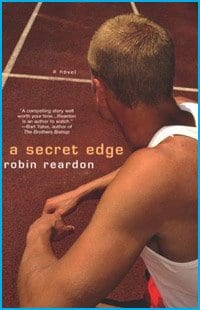Remember rock-hard stiffies that took your breath away while the parents watched Bob Newhart downstairs? (Okay, mine were watching Bonanza.) Remember that teen dick vibrating at high frequency and glistening with precum and prickling with the certainty of imminent eruption? Would you like to feel that surging mystery and thrilling confusion all over again, that magnetic pull to lithe, sweaty, track-and-field gods sweetly oblivious to their own impossible perfection?
As you’re lounging on a deck or dock some weekend soon, sipping your very adult G’n’T, you might want to have this “young adult” novel at hand. A Secret Edge is written from inside the teenage sexual and emotional vortex. Reading it feels like being there again: knowing the truth of your bursting desire, fearing it, going for it anyway because, quite simply, the body is in charge while the mind can only tag along in secret rapture.
Jason Peele is blond, lean and sweet 16, a long-distance kind of guy. He can sprint too, but he prefers the extended pleasure of endurance stretched to the point of agony, then the delicious breakthrough to nirvana: “This place where your mind and body are the same, no difference, no boundaries, and you feel like there are no boundaries for you anywhere.”
One boundary he’d like to transgress is the one around hunky, copper-skinned, raven-haired Nagaraju (“call me Raj”) Burugapalli. Aside from Raj’s exotic appeal for white-bread Jason, he seems to share in the gay gaze — if only for milliseconds at a time. Their mutual defences are breached the day after Jason endures an awkward double date with friend Robert and two girls. Knowing he really wanted to be snogging with Raj and not Meg in the back seat of Rob’s car, Jason works off the blues with a few laps around the track, then plops down on the grass beside the highjump pit, his mind fixated on Raj’s recent jump practice. “Right in front of me is where Raj’s body had settled so gracefully.”
But wait. Who’s that shadowy figure in the trees beyond the chain-link fence? Jason sees dark fingers curled through the links, grasping, as if eager to break through to him. It’s Raj. He was watching while Jason did his laps. Robin Reardon’s plotting may be a touch breathless, but when Jason runs to the fence, scales it in one lusty leap and ends up rolling around on the ground with Raj in a woodland idyll, it simply feels exhilarating.
Orphaned by a car crash as an infant, Jason has been raised by a sporty “no-nonsense” uncle and an aunt who’s a nurse. Her job-related sensitivities come in handy when Jason (spurred by his unstoppable lust for Raj) comes out to her. She’s simply glad he has finally acknowledged the desire she’s seen in him for years. On the night of his first official date with Raj, Jason finds a gift on his bed: condoms, with a note from aunty: “Just in case.”
Reardon is generous with the foreplay while delaying the clinch. When Jason and Raj lock themselves in Jason’s bedroom to “do homework,” the erotic sparks fly, then quickly get snuffed by Raj’s “husky” admonishment: “Don’t do that…. I might not be able to stop. When I should.” What Raj lacks in wild abandon he makes up for with some lessons in Hindu tradition. It seems that centuries ago queers in India were not only accepted, their presence on auspicious occasions was thought to bring good luck.
One day after a workout Raj and Jason end up secluded in the woods again. Reardon lifts the decorous veil at last. After some passionate kissing, Jason pulls Raj’s track pants to his knees. “And it’s right there, stiff as the wood of the trees, wanting me. That coffee-coloured cock that I tried so hard not to look at in the showers. And behind it, the almost purple mounds of his balls…. His whole body is rigid, legs shaking in tremors…. And when he comes, he makes almost no noise. It’s like the wind in the trees.”
There are some clear lessons in the novel — about honesty and self-respect, nonviolence, love and jealousy, safer sex, substance abuse and more — but Reardon expertly wraps his messages in plot and dialogue. His characters never feel like vehicles for a teen-counselling agenda. A very funny climax even manages to blend nail-biting suspense with a sort of parodic sissy-boy street theatre.
The book works on levels that will resonate for both teenage and adult readers. Teens will see themselves; parents will see what their kids — gay, straight or bi/curious — are struggling with. I really hope this touching and forthright novel finds its way onto some high school reading lists.

 Why you can trust Xtra
Why you can trust Xtra


